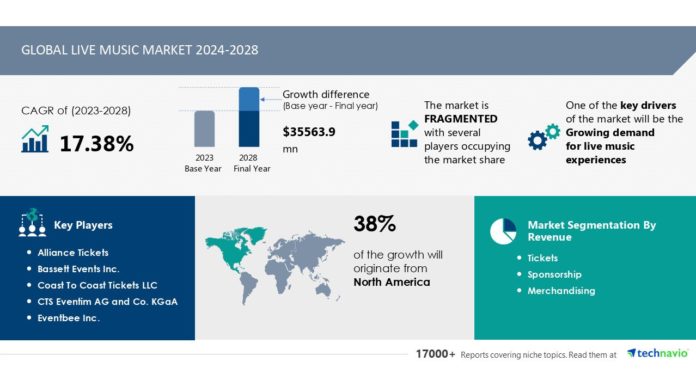The global live music market size is estimated to grow by USD 35.56 million from 2024-2028, according to Technavio. The market is estimated to grow at a CAGR of 17.38% during the forecast period. Growing demand for live music experiences is driving market growth, with a trend towards rise in adoption of virtual and hybrid live music experiences. However, privacy and security concerns over online ticket booking platforms poses a challenge. Key market players include Alliance Tickets, Bassett Events Inc., Coast To Coast Tickets LLC, CTS Eventim AG and Co. KGaA, Eventbee Inc., Eventbrite Inc., Event.com Inc., Live Nation Entertainment Inc., Lyte Inc., SeatGeek Inc., Sunrise Records Ltd., The Ticketline Network Ltd., Ticket City Inc., TicketNetwork Inc., TickPick LLC, TiqIQ LLC, TodayTix Inc., Viagogo Entertainment Inc., Vivendi SE, and Vivid Seats Inc..
The live music market has experienced a notable increase in the utilization of virtual and hybrid events. Due to technological advancements and the impact of COVID-19, artists and organizers have adopted innovative approaches to deliver live music experiences to a global audience. Virtual and hybrid events offer broader accessibility, enabling fans from around the world to participate.
They also provide opportunities for enhanced innovation and creativity, offering unique experiences and additional revenue streams for artists and organizers. Platforms like Mandolin and Veeps support this growth by offering tools and infrastructure for hosting virtual and hybrid events. These factors are expected to boost the adoption and growth of the live music market.
The live music market is thriving with various trends shaping the industry. Musicians use social media platforms to connect with fans and promote their events. Customers purchase tickets online for convenient access. Music festivals offer diverse genres, creating a unique experience for attendees. Venues invest in high-quality sound systems to enhance the live music experience.
Artists collaborate and create fusion music, adding to the trend. Audio technology advances, enabling virtual concerts and live streaming. The use of digital platforms has made live music more accessible and interactive than ever before. Overall, the live music market continues to evolve, providing endless opportunities for artists and fans alike.
Research report provides comprehensive data on impact of trend. For more details- Download a Sample Report
In the expanding digital landscape, the live music market faces growing concerns over customer privacy due to increased phishing threats. Service providers collect customer data through cookies for targeted offerings, raising privacy issues. Location-based services also pose challenges due to the requirement of geo-information.
To assure customers, retailers invest in advanced security measures like Extended Validation Secure Sockets Layer. These efforts aim to secure financial information and mitigate phishing risks, ensuring a reliable and secure market environment.
The live music market faces several challenges in the production and delivery of musical experiences. These include technical issues such as sound quality and consistency, logistical concerns like transportation and setup, and artistic challenges like securing top talent and meeting audience expectations.
Additionally, the rise of digital streaming platforms has disrupted traditional revenue streams, forcing live music providers to adapt and innovate. Producers must balance the need for profitability with the desire to create memorable experiences for their audiences. The use of technology, strategic partnerships, and creative marketing can help overcome these challenges and keep the live music industry thriving.
Live music markets provide businesses with opportunities to engage customers through authentic and interactive experiences. These markets foster community building and customer connection, leading to increased sales and repeat business. By offering a diverse range of musical genres and artists, businesses can cater to various audience preferences and attract a wider customer base. Additionally, collaborating with local musicians and organizations can boost brand image and support local culture. Overall, live music markets serve as valuable platforms for businesses to create memorable experiences and strengthen customer relationships.
The live music market encompasses a diverse range of genres, including Blues, Pop, Rock, Metal, and Electronica, catering to the varying customer preferences worldwide. Mobile apps have emerged as a significant trend, enabling users to access information about concerts, artists, tours, and festivals with ease. DJs and musicians perform live at these events, providing a cornerstone of social interaction for like-minded individuals, particularly the younger generation.
Decades of tradition and livelihood depend on these music events, which continue to evolve with emerging trends and local special circumstances. Macroeconomic factors also impact the market, with virtual online platforms and holograms offering new opportunities for live performance in an increasingly digital world.
The Live Music Market encompasses various elements of the music industry, focusing on live performances. Musicians and bands engage audiences in concerts, festivals, and events, delivering unique experiences. Concerts can take place in venues such as arenas, theaters, and clubs. The market involves music production, sound engineering, and event management.
Musicians use instruments and amplifiers to create sounds, while audiences enjoy the experience through ticketing services. Merchandise sales, sponsorships, and streaming platforms also contribute to the market. Music genres span across rock, pop, electronic, country, and more, catering to diverse audiences. The market continues to evolve with technological advancements, offering virtual concerts and immersive experiences.







